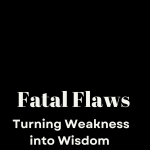
Breaking the Cycle: How the Karpman Drama Triangle Affects Family Dynamics
The mother-daughter relationship can be one of the most complex and rewarding connections in life. In 2016, I felt God calling me back to Texas—a move I never saw coming. My plan was simple: stay with my mom, find a job, and move out.
Six months in, I looked at my mom and said, “Okay, it’s time for me to move out.”
She looked at me, panic written all over her face. “I don’t want you to leave.”
That shocked me. That wasn’t the mom I knew.
I think she was lonely, and having me there helped with that. So I said, “Okay, I’ll stay.”
We worked well together. We didn’t get in each other’s way, we let each other be, and we were independent while still having each other. But living together at different stages of life came with its own adjustments—like the battle of the thermostat. She wanted the house to be 80 degrees, and with menopause in full swing, I needed it cold. So, I bought my own portable AC unit to accommodate the difference.
She also became the editor of my first book, Testosterone: The Next Drug Epidemic. Working with her in that capacity was fascinating—a story for another time.
It was a good setup. But what I didn’t realize at the time was just how much I would learn about her—and myself.
For most of my life, I carried the weight of family dynamics, often blaming myself for problems, feeling responsible for fixing things, and stepping into the role of the protector. Maybe that’s how I became an Enneagram 8—the challenger, the defender, the one who stands up for others and is willing to take a hit.
But what I didn’t realize then was how deeply ingrained patterns—especially those described by the Karpman Drama Triangle—were playing out in our daily interactions.
What is the Karpman Drama Triangle?
The Karpman Drama Triangle is a psychological model that explains dysfunctional relationship dynamics. It identifies three main roles that people unconsciously play:
• Victim – Feels helpless, blames others, avoids responsibility.
• Persecutor – Blames, criticizes, and often attacks others.
• Rescuer – Tries to fix everything, taking on responsibilities that aren’t theirs.
People often rotate between these roles without realizing it, keeping conflicts alive rather than resolving them. I saw this dynamic clearly play out when my mother mentioned that she wanted to live like she did in Africa—in a small, simple space.
The Situation: A Slow-Burn Conflict
My mom’s master bedroom was huge, so I suggested that I move my office and bedroom into it, she could take a smaller room, and we could create a guest space for my brother or visitors.
She responded, “Let me think about it.”
I knew my mom well—she needed to do things on her own time and in her own way. So, I waited.
A month later, I gently asked, “Mom, have you thought about what you’d like to do?”
“No, I don’t want to think about it.”
Okay. I let it be.
Thanksgiving approached, and I reminded her, “Mom, the holidays are coming, and Trevor and Ryan will be back from college, and I need to get on their schedule. I’d love to get things settled before then.”
“No, I don’t want to make a decision.”
December came, and I nudged again, this time with Christmas in mind. “Trevor and Ryan will be here soon. If we don’t do it now, it’ll have to wait until next year.”
Finally, she said, “Okay, let’s do it.”
The Scramble & The Shift in Roles
Now I had four days to paint, design, and move three entire rooms. As if that weren’t enough, I also got COVID. Sick, exhausted, and overwhelmed, I still pushed through—painting, moving clothes and books, running back and forth to Lowe’s and Home Depot.
At this point, I needed help. So, I reached out to my brother, explaining what needed to be done and asking if he could assist with moving furniture and hanging drapes.
His response? “Why do you always wait until the last minute?”
I was shocked. And then, I was angry.
I had spent months trying to plan this, only for my mom to delay the decision over and over again. But somehow, I was the one being blamed for procrastination.
I could have warned my brother earlier—given him a heads-up that this might be happening—but I hadn’t. And now, in his eyes, it was all on me.
Recognizing the Drama Triangle at Play
Looking back, I see how the Karpman Drama Triangle unfolded:
1. My mom started as the Victim – She avoided making a decision, letting the burden fall on me.
2. I stepped in as the Rescuer – I tried to fix the situation, managing everything myself.
3. When my brother blamed me, he became the Persecutor – Criticizing me for something I had little control over.
4. I then shifted into the Victim role – Feeling unfairly blamed, unappreciated, and frustrated.
Breaking the Cycle
This is how family dynamics often trap us. We rotate through these roles, reinforcing unhealthy patterns instead of addressing the real issue. So how do we break free?
• Clearer communication – If I had told my brother earlier, “Mom is undecided, but I may need help moving things last-minute,” he might not have blamed me.
• Setting boundaries – I took on more than I should have. Next time, I could set a deadline: “Mom, if you don’t decide by X date, we’ll leave everything as is.”
• Owning our choices without resentment – Instead of fuming when my brother reacted, I could have calmly said, “I totally get why it seems last-minute, but I actually started this process in September. I’ve just been waiting on Mom’s decision.”
The Drama Triangle in Everyday Life
These roles don’t just play out in families—they show up in friendships, workplaces, and relationships. Have you ever noticed when you or someone else is playing the Victim, Persecutor, or Rescuer?
• The friend who always needs saving but never takes action.
• The coworker who blames everyone else instead of taking accountability.
• The person who fixes everyone’s problems but ends up exhausted.
Awareness is the first step. Once you see the pattern, you can choose a different response.
The Karpman Drama Triangle plays out everywhere—in families, friendships, and even workplaces. The key is awareness—recognizing when we’re slipping into a role and choosing a different response.
For me, this experience was a reminder that not everything is mine to fix. Just because I can carry the weight doesn’t mean I should.
Are there areas in your life where you find yourself playing the Rescuer, Victim, or Persecutor?
Recognizing the pattern is the first step to breaking free.
Let’s stop running in circles and start moving forward—one conscious choice at a time.






